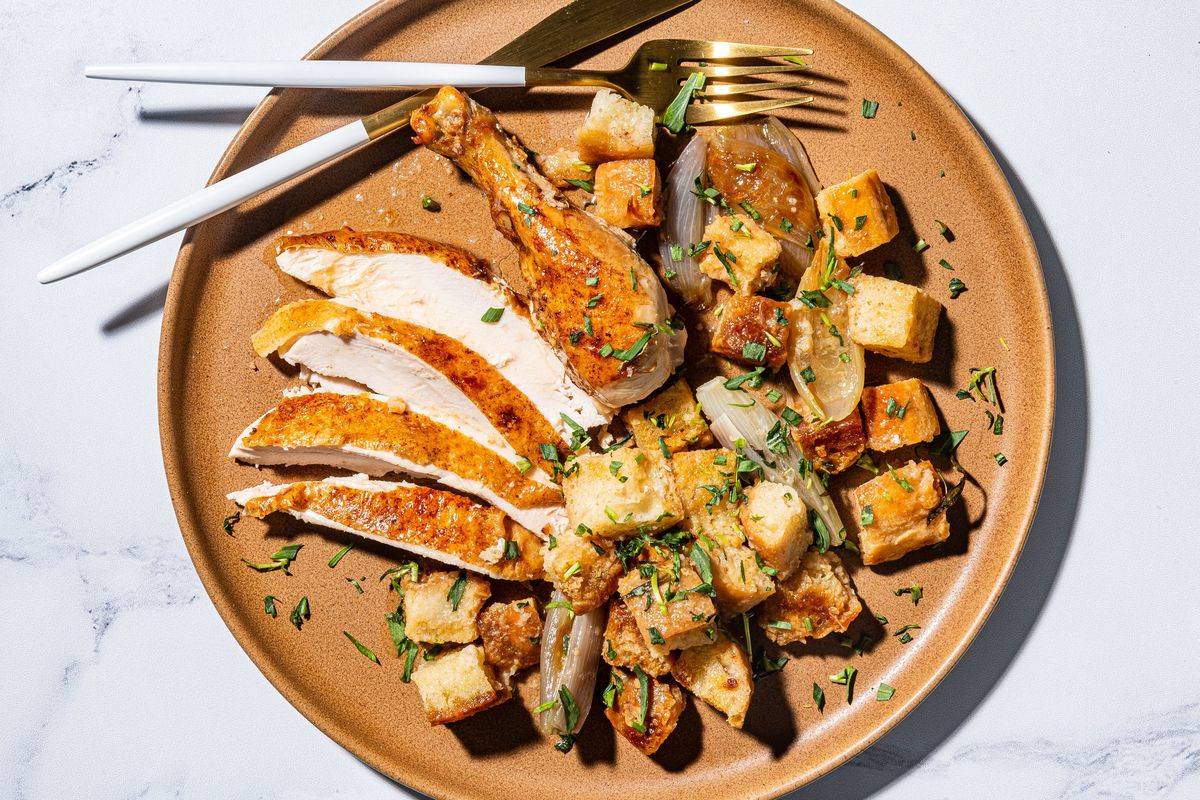One-pot roast chicken with bread and drippings is a weeknight feast

A good roasted chicken is a simple, elegant thing. But if I’m being honest, the thing I love most about roast chicken is the drippings. I love the salty fat so much that for the past five years, I have almost exclusively roasted chickens on top of piles of stale bread. Then, while everyone else digs into the meat, I pluck out the bread. This makeshift dressing, salty and rich, is so satisfying that I’ve made a full dinner of it more than once.
This recipe was inspired in part by my penchant for that rough, flavorful dressing. It’s also a callout to tarragon, a tender, sprightly herb with a bewitching flavor somewhere between mint and lemon, with a hint of anise. Tarragon is a perennial, and it grows fine indoors, but its early spring leaves are especially fragrant – a gardener’s gift.
You’ll notice that the recipe is easy to remember – it’s a 1-2-3-4-5-6 recipe! – and that’s intentional. I hope this formula might turn into a keeper for you, an easy-to-remember and easier-to-follow structure to apply to any chicken, seasoned however you like it, any time of year.
Roasted in a Dutch oven, the chicken cooks quickly – in less than an hour! – and it has its own built-in side dish (the bread). Because it’s mostly hands-off, you’ll have time to do the dishes (there are very few), maybe make a salad out of crisp, spring greens and herbs, mix together a mustard dressing, watch the birds flit from tree to tree outside your window or even do a crossword.
Spring Chicken in a Pot
Roasted in a large pot or Dutch oven, this chicken emerges juicy and scented with the sprightly flavor of tarragon. If you don’t like tarragon, use another herb or a seasoning blend such as herbes de Provence. Shallots and bread, tossed in the same pot, turn into a rough dressing as the chicken cooks. Serve the chicken, bread and shallots with a simple salad, thick dollop of Dijon mustard, squeeze of lemon, splash of dry white wine or just lots of freshly cracked black pepper.
There are an almost endless number of ways to play around with this formula. Here are a few basic substitution suggestions:
Not a chicken eater? Try this with a halved cauliflower, no more than 2 pounds. Rub it with oil, season with 1 teaspoon fine salt and sear the cut side, then stand the halves up and roast them with garlic and a favorite seasoning blend (garam masala, za’atar, sazón, lemon pepper) tossed in for good measure. Add 1 or 2 cups of cooked white beans to the finished roast for extra protein.
To reduce the sodium, use half the salt.
I wouldn’t omit the ghee or oil, but if you do, watch that the bread doesn’t burn before the chicken is fully cooked.
Out of shallots? Go for garlic or use onions, cut into wedges.
No tarragon? Use any herb or seasoning, fresh or dried.
Want to skip the bread? Use potatoes or sweet potatoes (cut into bite-size pieces) or mushrooms (sliced) or double the shallots.
OK, here’s the recipe:
1 (3- to 3½-pound) whole chicken (see note)
2 teaspoons fine salt
3 tablespoons ghee or olive oil
4 large shallots (8 ounces total), peeled and halved
5 sprigs fresh tarragon or 1 tablespoon dried
6 slices (6 ounces) crusty bread such as ciabatta, cut into large cubes
Pat the chicken dry and season it, inside and out, with the salt.
Position a rack in the middle of an oven and preheat to 450 degrees.
In a large Dutch oven over high heat, melt the ghee or heat the olive oil until it shimmers. Carefully add the chicken, breast side down, and allow it to brown, about 4 minutes. Cover the pot with a splatter guard, if necessary. Remove from the heat.
Using tongs, flip the chicken over onto its back. Add the shallots to the sides of the pot, and toss the tarragon and cubes of bread over them, leaving the chicken mostly exposed. Cover tightly and transfer to the oven. Roast for 35 minutes.
Uncover the pot and check the chicken’s temperature; a thermometer inserted in the thickest part of the thigh should read 160 to 165 degrees. If the chicken is not done, continue cooking, uncovered, for an additional 10 to 15 minutes. Allow the chicken, shallots and bread to rest in the pot for 10 minutes before serving it all family-style.
Yield: 4-6 servings
Note: For a prettier presentation, tie the legs together before cooking. If you use a larger bird (4 pounds or more), it will take longer to roast.
Storage notes: Leftovers can be refrigerated for up to 4 days.